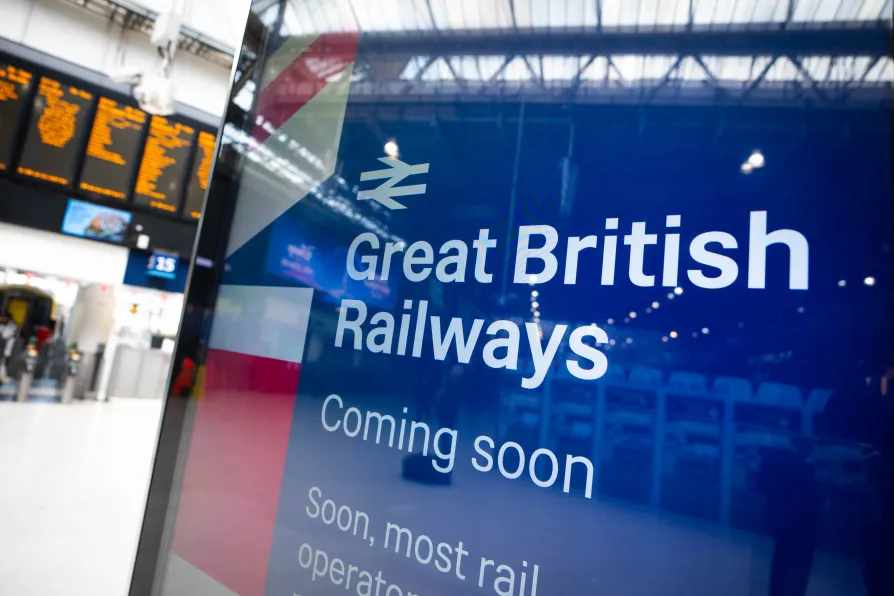
 Signage at Waterloo train station in central London as South Western Railway (SWR) becomes the first rail operator to be renationalised under the Labour Government's Passenger Railway Services (Public Ownership) Act 2024, May 25, 2025
Signage at Waterloo train station in central London as South Western Railway (SWR) becomes the first rail operator to be renationalised under the Labour Government's Passenger Railway Services (Public Ownership) Act 2024, May 25, 2025
HEIDI ALEXANDER hails a “new dawn for our railways” as South Western Railway (SWR) becomes the first train operating company taken back into public hands under Labour’s renationalisation programme.
Her assessment of rail privatisation as “30 years of inefficiency, delayed services and failing passengers” will resonate with passengers and rail workers, who look forward to SWR being followed by every other train operator over the next two years.
Privatisation has been a costly failure, leaving the country that invented rail with the most expensive and least reliable railway in Europe. Meanwhile, the operators who’ve delivered this shoddy service have siphoned out fat profits for doing little or nothing: rail franchises were a “licence to print money,” as tycoon Richard Branson once bragged.
Labour will have to go further, however, to justify talk of a “new dawn.”
Kicking out the privateers should be just the first step — and even that isn’t complete.
Great British Railways continue to lease its rolling stock from private companies (Roscos) whose hefty charges and lavish dividends have prompted an investigation by the Office of Rail and Road into whether they “are acting in the best interests of passengers and taxpayers.” Hint: they’re not, since they are private companies whose own “best interest” lies in extorting as much money as they can out of both.
Labour has no plans to take the Roscos back or even set up a publicly owned alternative. Nor is the party’s promise of the “biggest wave of in-sourcing” in a generation any more evident for rail than it is across the rest of the public sector: as transport union RMT points out, nationalised SWR will continue outsourcing cleaning, security and gateline (passenger assistance at ticket barriers) roles to private companies, which is inefficient and drives down pay and conditions.
Alexander’s admission that she “can’t promise you” there will be any reduction in ticket prices underlines a lack of ambition that could prove fatal.
Her contention that the priority is to improve services and invest in infrastructure is reasonable, but the challenge of climate change requires a revolution in public transport. Rail is the greenest form of mass transit for both passengers and goods.
Reducing the number of cars on the road — essential to lower emissions, and with added benefits in terms of air quality and public safety — means increasing the number of passenger journeys, and this will not happen while ticket prices are so high. It is wrong, and damaging, that it is often cheaper to take a domestic flight in Britain than to go by train.
A good first step, already promised by the Scottish government, is the abolition of peak fares: charging people heading to and from work the most is utterly illogical given the government’s supposed obsession with economic growth.
But we should also look to the example of an increasing number of European countries including France, Germany and Spain, which have introduced affordable monthly passes allowing unlimited journeys — for prices (currently €49 (£41) in France, or €58 (£49) in Germany) often cheaper than a single intercity ticket in Britain.
Given a penny-pinching Treasury and Britain’s longstanding political promotion of motorists, this may not be seen as a priority. But Labour needs to think big.
The government is neither popular nor trusted. Inching our way towards an improved transport network, explaining to people they will feel the benefit in five or 10 years, will not cut it: change needs to be dramatic and benefits tangible if the party hopes to be re-elected. If it isn’t, there is no guarantee a Tory or Reform successor would even maintain the limited form of public ownership being reintroduced.
So MPs should speak up. Today was a good day for the railway. But to merit talk of a “new dawn,” we must go much, much further.

A just transition to Great British Railways and a clean and safe railway for all is not only desirable but also necessary. MARYAM ESLAMDOUST explains

But unions warn renationalisation must not be fudged











